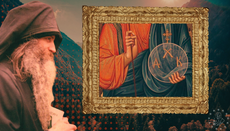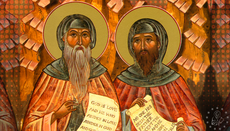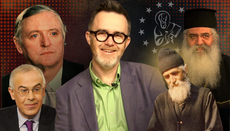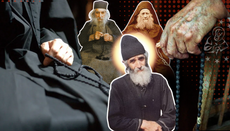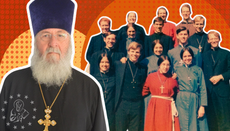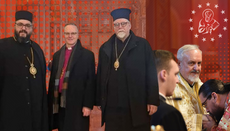Too 'Western' for Orthodoxy?
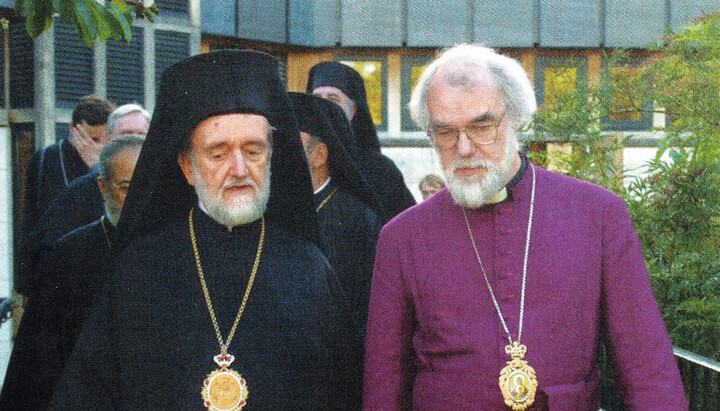
Most Catholics and Protestants seem to recognize that the Orthodox have done a better job of preserving our ancient theological, spiritual, and liturgical traditions than they have. Nevertheless, they feel they must be Catholic or Protestant, out of loyalty to “the West." This is a mistake.
Bishop Joseph Boyd of the “Ancient Church of the West” has taken umbrage with the Union of Orthodox Journalists’ coverage of a rupture within the Anglican Province of America. The article itself was straight reporting; however, we gave the piece a (gently) mocking title: “Schismatic Anglican Bishop Schisms from Schismatic Anglican Sect.”
I don’t blame Boyd for being offended. And my colleague Ben Dixon has already responded substantially to many of his claims. Still, it’s an excuse for me to address a topic I’ve been wanting to write about for some time now: This idea of being “too ‘Western’ for Orthodoxy.”
In the course of my own “faith journey,” I moved from Anglicanism to Catholicism to Orthodoxy. One thing I noticed, while moving from one community to the next, is this: While Catholics and Protestants constantly accuse Orthodoxy of being too “ethnic,” they are far more preoccupied with ethos than we are.
Now, I have met Greeks who view the Greek Orthodox Church purely in terms of “Greekness.” Yet, having grown up in the Greater Boston Area, I also know many Catholics who understand their church mainly as an expression of their Irishness or Italianness. Ditto with WASPs and the Episcopal Church. (Tucker Carlson is one such example.) This sort of “tribalism” exists in every religion. Generally, it’s merely a popular prejudice—not an article of faith.
Yet as Orthodoxy continues to grow in popularity, we increasingly find Catholics and Protestants increasingly appeal to ethnicity in order to establish their own legitimacy. For instance, Boyd writes:
We have returned to the ancient Western liturgy, the Divine Liturgy of Saint James, and to the Apostolic Constitutions rather than the 39 Articles, embodying an Orthodox and English, Apostolic and Western identity, that is not the result of anti-apostolic canonical fundamentalism or Protestant innovation, but of direct and faithful continuity with the Ancient Church within our own holy patrimony
(...)
Our Church, the Ancient Church of the West stands as a witness: there is a way that is Orthodox, English, Apostolic, and faithful. You do not have to compromise. You do not have to sell yourself into slavery and indentured servitude to Turkish or Slavic overlords.
I know where Boyd is coming from,and I respect his position. However, I have come to the conclusion that most talk of “Western identity” and “English patrimony” is quite hollow.
For instance, I know one person whose family has worshiped at the Latin Mass in unbroken succession since the Council of Trent. (She belongs to one of the “founding families” of the Society of Saint Pius X.) Everyone else I’ve ever met at a Latin Mass parish made the conscious decision to seek out the Latin Mass.
I imagine the same is, for the most part, true of conservative Anglicanism. This isn’t something they simply inherited from their ancestors. It was something they had to choose—to fight for, even. And, more often than not, they were fighting against their own Church.
Now, I don’t say this derisively! On the contrary. I admire conservative Anglicans and traditionalist Catholics for resisting the “spirit of the age.” I admire them for defending the Christian faith (as they understand it), even when it puts them in an awkward position vis a vis their own Church’s authorities.
However, I find it more than a little odd when they then turn around and present the Orthodox Church as some strange cult from the misty Orient. This is absurd on two levels.
First, Greece and Russia are only considered “Eastern” in terms of Christianity. Most right-wing Westerners will eagerly claim Plato and Dostoyevsky as part of their heritage. Why, then, is Orthodoxy considered an alien force?
Second, and more importantly, it suggests that Westerners are something other than rootless cosmopolitans.
In Orthodox countries like Greece, traditional Orthodoxy remains the default. They have an instinctual dislike of homosexuality, a deep reverence for the Holy Eucharist, and a love for the holy icons. They will kiss the hand of an Orthodox priest even if they haven’t been to a liturgy in ten years. We have Greek friends who are not especially devout, and yet were horrified by the Catholic teaching thatChristians and Muslims worship the same God.
The truth is that no one in the Western world has such religious instincts. We have nothing to rival the “Greek patrimony” or “Orthodox identity” found among the Hellenes—that is, a religious sensibility that resonates on both a collective and an instinctual level. This is especially true of the United States, which actively works to dissolve such identities and loyalties.
So, it would make more sense to speak of the “English patrimony” if most Brits still memorized Shakespeare and Donne in grammar school and wore tweed suits on the train. This would suggest that English civilization required a uniquely English expression of Christianity. Yet the sad reality is that English civilization has gone extinct—as Peter Hitchens, the world’s most famous English Anglican, will be the first to admit. Anglicanism doesn’t resonate with English people on an instinctual level anymore.
Likewise, traditionalist Catholicism is bound up with a particular Baroque vision of Continental Europe. It is strongly associated with royal saints such as Charles I of Austria and Louis IX of France. But, again, the average Italian-American in Chicago did not learn to revere the House of Habsburg from his pious nonna. Her religious feelings may have been deeply “Italian” in some sense; she may have had a strong devotion to Anthony of Padua or Padre Pio, for instance. But she probably wasn’t loyal to the Latin Mass—much less the House of Habsburg.
Again, I’m not saying that Anglicanism and Catholicism are, therefore, untrue. I’m not even saying that they have no special appeal to us as Westerners.
My point is that, for better or worse, every Western man (and woman) must choose his (or her) identity. We do not inherit tradition: we embrace tradition. This is part of living in a multicultural, consumer-capitalist society. And for those of us who choose one of these older traditions—whether it’s Orthodox Christianity, traditionalist Catholicism, or conservative Anglicanism—this choice almost certainly entails a major rupture with the faith and culture that we inherited from our parents. Very often, it requires us to separate ourselves, in part or in whole, from the community of our birth. (That’s assuming they passed down any faith or culture to begin with, or that we had any community to speak of.)
Part of what makes conservative Anglicanism and traditionalist Catholicism so appealing is that it gives us the illusion of identity. It lets us pretend that we don’t actually need to make a choice—that the choice was made for us, so to speak. It makes us feel like we are authentic, rooted, and unaffected. Yet it’s only that: an illusion.
For instance, if you’re Irish-American, the majority of your ancestors were some sort of Druid. When they converted to Christianity in the first century, their faith and worship owed as much to the Byzantine and Coptic traditions as to the Latin. In fact, they didn’t celebrate the same liturgy as Continental Europe until after the Great Schism. And today? Most of your immediate family—including your parents—are, at best, Novus Ordo Catholics. More likely, they’re Moralistic Therapeutic Deists who only go to church for weddings and funerals.
So, why have you decided that the Tridentine expression of Roman Catholicism that existed between approximately 1563 and 1965 is the purest and most authentic expression of Irish religiosity? And what does it mean that the majority of Irishmen today have abandoned the Catholic Church completely?
Again, I am not trying to insult our Catholic and Anglican friends. On the contrary, I admire their tenacity! Still, this idea that they are traditionalist Catholics or conservative Anglicans “by default” is absurd.
This is not, in itself, an argument for Orthodoxy. However, I believe this idea that Orthodoxy is “too Eastern” is a major (if unconscious) obstacle for many would-be converts to Orthodoxy. Most Catholics and Protestants seem to recognize (if grudgingly) that the Orthodox have done a better job of preserving our ancient theological, spiritual, and liturgical traditions than they have. They recognize that we have preserved the Apostolic and Patristic heritage better than any other "denomination." Nevertheless, they feel they must be Catholic or Protestant, out of loyalty to “the West."
I believe that, if they could overcome this obstacle, Orthodoxy would present itself as the obvious choice.
It has also been my experience that, when a Westerner enters the Orthodox Church, they feel more connected to the ancient Western Church than ever before.
For instance, I’ve met fellow converts who have taken Augustine of Canterbury, Augustine of Hippo, Beatrice of Rome, Benedict of Norcia, Columba of Scotland, Edmund the Confessor, Gregory the Great, Melengell of Wales, Patrick of Ireland, and Vincent of Lerins as their patron saints—to name just a few.
And the more I study the history of the Western Church in the first millennium—especially in the British Isles—the more convinced I become that, on balance, their theology, ecclesiology, and spirituality was far more Orthodox than it was Catholic or Anglican (however one defines “Anglican”).
For instance, I was amazed to learn that, in the Stowe Missal, the priest is instructed to commemorate, not the Roman pontiff or the Archbishop of Canterbury, but the Byzantine Emperor! Likewise, the filioque was not used in Ireland until after 1054, when it was imposed by the Normans under orders from the Pope. It’s also interesting to note that the British monastic tradition, which has been credited with saving Western civilization, was established largely by Egyptian monks!
Of course, I’m not Orthodox because my Irish ancestors were Orthodox. I’m Orthodox because I believe in Orthodoxy, and in the Orthodox Church. But it helps.
One of the great saints of our time, Saint John of San Francisco, worked tirelessly to establish a Western-Rite Orthodoxy. As St. John himself said: “Never, never, never let anyone tell you that in order to be Orthodox you must also be Eastern. The West was fully Orthodox for a thousand years and her venerable liturgy is far older than any of her heresies.”
I believe this will resonate instinctively with Orthodox Christians, and not only those who attend the Western Rite. Yet it’s also true for those who, like me, exclusively attend the Byzantine Rite. We love and admire the Western Orthodox heritage: theological, liturgical, and spiritual. We desire to preserve as much of that heritage as we possibly can.
However, we also believe that these popes and fathers and saints prized one thing above all others: fidelity to the One, Holy, Catholic and Apostolic Church. And that, we believe, is the Orthodox Church.
Again, I don’t expect this to win over Bishop Boyd. But I do hope that it helps to break down a bit of this pseudo-tribalism which, for so many, is the main obstacle to becoming Orthodox. As Fr. Patrick Cardine put it, “Orthodoxy is your heritage—and your home.”
